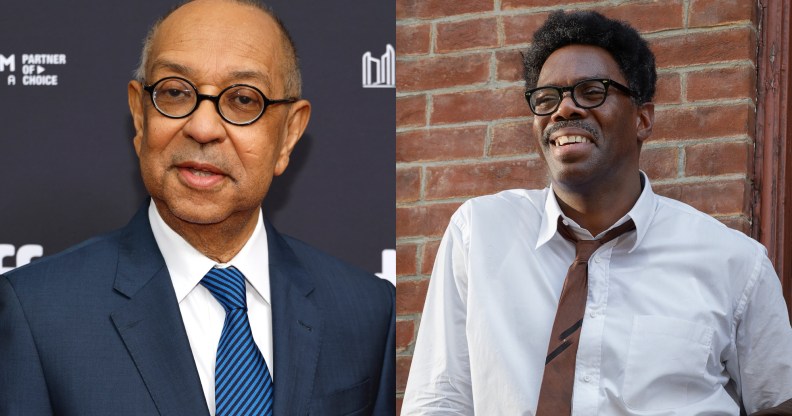Rustin director says gay civil rights activist Bayard Rustin was ‘very out’ for the 1960s

Director George C. Wolfe (L) and Colman Domingo as Bayard Rustin (R). (Getty/Netflix)
George C. Wolfe, director of Netflix’ upcoming biopic Rustin, about the pivotal Black US civil rights activist Bayard Rustin, reflected on the historic figure’s identity as a gay man.
The film stars Fear the Walking Dead‘s Colman Domingo as Bayard Rustin, whose legacy as the organiser behind the history-making 1963 Washington March (where Martin Luther King famously made his “I have a dream” speech) was buried due his publicly known homosexuality.
Executive produced by Barack and Michelle Obama, Rustin offers an incisive and complex portrayal of key civil rights activists of the era, including Roy Wilkins (Chris Rock), A. Philip Randolph (Glynn Turman), Ella Baker (Audra McDonald) and MLK (Aml Ameen).
However, five-time Tony winner Wolfe (who previously worked with Domingo on Ma Rainey’s Black Bottom) has made clear that the film will not shy away from Rustin’s sexuality, exploring the persecution the Quaker from West Chester, Pennsylvania, faced from within and outside of his community.
“The thing that intrigued me most is, for 1963, [Rustin] was a very out version of an out homosexual,” Wolfe told Entertainment Weekly.
“And I think there was a kind of a sense of, for lack of better words, efficiency about him. He was so busy being focused on what he had to change and what the agenda was at stake, that that was driving him. So him being out was just a natural, healthy manifestation of who he was.”
Wolfe went on to explain that beyond the main plot tracing the events that led up to the monumental Washington March, he was determined to give Rustin’s sexuality its moment in the sun.
He continued: “There was this one little corner where there was still a piece of shame, and ultimately, the film — in addition to delivering this March on Washington — was delivering him to the other side of that tiny little piece of shame.
“Most of the manifestations of his homosexuality were in shadows, were in bars, were in dark rooms, and on dark streets. So the film is about the journey from shadow into claiming in the daylight.”
Rustin‘s climax will explore the moment in 1963 that hundred of thousands of people marched in Washington DC to fight for a future without segregation and equality for all Black people, with Bayard Rustin among them.
“When he shows up in DC, he’s showing up as an activist, as a Black man, and as a gay man — unapologetic,” Wolfe explained.
“And he’s there and he’s made that process and the journey and confronted the person who I think he cares for and loves for deeply as another human being, and that was MLK. That was very important that somehow that all came together for him.”
Rustin lands on Netflix on 17 November, 2023.
How did this story make you feel?

